Impairments related to coronavirus have been on lots of people’s minds this quarter. Now, for the first time, we have a specific glimpse into the SEC’s thoughts on the issue too. Carlisle Companies Inc. ($CSL), a manufacturing business with about $4.8 billion in annual sales, seems to be the first company to have an SEC comment letter asking about Covid-19 impairments.
The letter and Carlisle’s reply were exchanged in May, but SEC comment letters typically don’t become public for several weeks after that. Special thanks to eagle-eyed Olga Usvyatsky, who noticed the comment letter while poking around the SEC comment letter database and posted the news to Twitter.
So what happened? In Carlisle’s first-quarter report (filed on April 23), the company said that it had assessed its goodwill and intangible assets and concluded that despite the likelihood of reduced revenue for the rest of 2020, coronavirus had not affected the value of those assets, so no impairment charges were necessary.
Carlisle even disclosed its valuation methodology and key assumptions it used. See Figure 1, below.

Fair enough; it’s not Calcbench’s place to judge a firm’s statements about impairment. The SEC, on the other hand, has warned firms that impairments related to Covid-19 are a priority item.
Perhaps it’s no surprise, then, that the SEC dashed off a comment letter to Carlisle asking for more clarity about how much the carrying value of its goodwill and intangible assets exceeded book value. Here’s what the SEC had to say:
To provide investors with information to better assess the probability of future goodwill impairment charges, please disclose, if accurate, that the estimated fair values of the intangible assets you quantitatively tested for impairment substantially exceeded their carrying values. For any asset whose estimated fair value did not substantially exceed its carrying value, please disclose the percentage by which fair value exceeded carrying value at the date of the most recent test.
You can see the SEC’s logic here, and it’s a fair point to raise. If its intangible assets were only a hair above book value in Q1 2020, with more Covid-19 disruptions likely to come later this year — then yes, it’s possible that an impairment charge will be necessary sometime soon. On the other hand, if the assets are well above book value, then impairment would be less likely, even with Covid-19.
Carlisle heard the SEC’s message and promised more fulsome disclosure in filings to come. It gave the text below as a sample response, with the relevant material underlined:
In the first quarter of 2020, changes in facts and circumstances and general market declines from COVID-19 resulted in reduced expectations of future operating results. We considered these circumstances and the potential long-term impact on cash flows associated with our reporting units and determined that an indicator of possible impairment existed within our CFT and CBF reporting units. Accordingly, we tested our goodwill for impairment as of March 31, 2020. Those reporting units were tested for impairment using the quantitative approach described above, resulting in fair value that exceeded the carrying amount for each of the reporting units by approximately 10 percent. The carrying amount of goodwill for the CFT and CBF reporting units was $185.6 million and $96.4 million, respectively.
Just food for thought for financial analysts and corporate disclosure executives out there, wondering what you should say about financial risks and Covid-19. You can learn a lot by reading other firms’ correspondence.
Don’t forget, Calcbench subscribers can search SEC comment letters and firms’ responses (once the letters become public on the SEC website, which takes a few weeks).
The letters are indexed on our Interactive Disclosures page. Set up the firms whose disclosures you want to search and the time period in question, and then select “SEC Comment Letters & Responses” from the Choose Disclosure Type menu on the left side of the screen. Then you’re good to go.